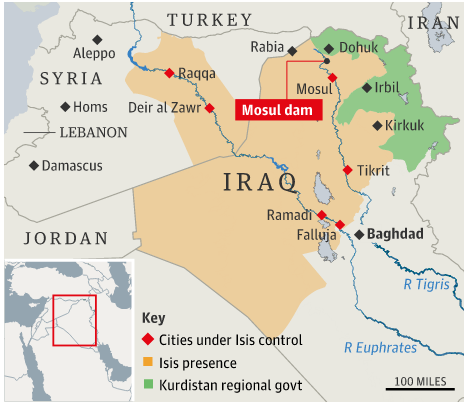Over the weekend, ISIS launched a new offensive on the Syrian-Turkish border town, where Kurdish fighters are still holding on after six weeks under siege. While others have called Kobani ISIS’s Stalingrad or its Waterloo, Mark Thompson relays concerns “that the focus on saving Kobani is giving ISIS free reign elsewhere in its self-declared caliphate—that the U.S., in essence, could end up winning the battle while losing the war”:
“The U.S. air campaign has turned into an unfocused mess,” Anthony Cordesman of the Center for Strategic and International Studies wrote Friday. “The U.S. has shifted limited air strike resources to focus on Syria and a militarily meaningless and isolated small Syrian Kurdish enclave at Kobani at the expense of supporting Iraqi forces in Anbar and intensifying the air campaign against other Islamic State targets in Syria.”
Senator Joe Manchin, D-W.Va., expressed frustration that the Obama Administration believes its latest fight against ISIS will yield success when the wars in Afghanistan and Iraq didn’t. “We understand the definition of insanity: continue to do the same thing and expect something different to happen,” he said Sunday on CBS’s Face the Nation. “If we can contain them there, leave them there, I don’t know what else to do. They’re intent on destroying each other, and they’ve been doing it for 1,400 years.” The chattering classes are likewise not impressed by the fight for Kobani and the overall U.S. strategy against ISIS.
But Drum isn’t sure that we can judge the success of that strategy just yet:
The flip side of this is the obvious one: have patience. “Here we are not three months into it and there are critics saying it’s falling apart; it’s failing; the strategy is not sound,” Rear Admiral John Kirby, the Pentagon spokesman, said Friday. “The strategy is sound and it’s working and there’s no plans to deviate it from right now.” If we’re really engaged in a years-long battle against ISIS, then a few months here or there doesn’t matter much. And saving Kobani is not just a moral good, but can also demonstrate to others that ISIS is not some magical, unstoppable force destined to overrun Iraq. It’s just an ordinary group of guerrilla soldiers who can be defeated with determination and patience. Stay tuned.
Still, there are other battles going on. Dettmer calls attention to Aleppo, where commanders “from the Western-backed Free Syrian Army are calling on the United States to launch airstrikes that will help them halt Assad’s forces”:
Without such action, they fear, many of their surviving troops may be lured into the ranks of ISIS. The offensive has been building up since early October. Now, Syrian army units backed by Shia Muslim fighters from Afghanistan, Lebanon and Iran are poised to cut the one remaining land route into Aleppo used by mainly Sunni rebels to resupply their forces, ferry in reinforcements, and evacuate their wounded. If the Assad regime severs the Castillo Road, which connects the rebels with the Syrian countryside and Turkey, it would set the stage for a full-scale siege of rebel-held districts in the city. …
Rebel commanders express deep frustration with the U.S.-led coalition focusing airstrikes on the defense of the Kurdish town of Kobani in a bid to lift a month-long assault by ISIS militants. They argue that a siege of Aleppo, once Syria’s commercial hub, risks even greater ramifications, not only for the Obama administration’s objective to “degrade and defeat” the self-proclaimed Islamic State, widely known as ISIS or ISIL, but also for the course of the uprising against President Assad.
Meanwhile, fighting broke out over the weekend in northern Lebanon between the military and Sunni militants linked to ISIS:
The violence is the worst in months and has centered in Tripoli, an impoverished city of predominantly Sunni Muslims that has experienced regular unrest because of sectarian divisions over the three-year-old Syrian conflict. Ten soldiers and one civilian have been killed in the clashes, a Lebanese military spokesman confirmed in a text message, which also said soldiers had arrested 25 militants. The violence began Friday evening with militant attacks on army positions. More than a dozen troops also have been wounded in the fighting, and at least one has been reported kidnapped.
Tripoli’s Sunni and Shiite neighborhoods have served as a microcosm of the Syrian conflict’s sectarian dimension since the war began three years ago, playing host to frequent clashes. Walter Russell Mead stresses the human and social costs the Syrian war has imposed on Lebanon thus far. All things considered, it’s a bit of a miracle the country hasn’t fallen apart entirely:
In a country of less than 5 million, including some 500,000 Palestinian refugees, there are now 1.2 million registered Syrian refugees, with an unknown and possibly huge number of unregistered refugees. (Looking to hedge further exposure to the Syrian crisis and avoid a demographic disaster, Lebanon closed the border to refugees earlier this week.) To top it off, the alienation of Lebanon’s Sunnis has begun to affect even the national army, which has seen soldiers defect to join ISIS or al-Nusra. And even without the threat to morale that defections pose, the Lebanese army isn’t in the best of shape; it doesn’t have the financing to properly equip itself. … The small, poorly equipped, untested Lebanese army leaves Lebanon dangerously vulnerable to ISIS—and to the fast-growing threat from within its own borders.
